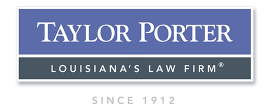EEOC Issues Updated Guidance: COVID-19 Technical Assistance Publication
May 11, 2020
By Vicki M. Crochet - Partner, Employment, Labor and Benefits Practice Group Leader,
Executive Committee Vice-Chair | vicki.crochet@taylorporter.com
and M. Lenore Feeney - Of Counsel | lenore.feeney@taylorporter.com
On May 5, 2020, the Equal Employment Opportunity Commission updated its guidance related to the impact of COVID-19 on the ADA, the Rehabilitation Act, and other Equal Employment Opportunity laws. This is a summary of this recent guidance. The complete guidance can be accessed at: https://www.eeoc.gov/wysk/what-you-should-know-about-covid-19-and-ada-rehabilitation-act-and-other-eeo-laws?utm_content=&utm_medium=email&utm_name=&utm_source=govdelivery&utm_term=
Accommodation of an Employee with an Underlying Medical Condition
If an employee has an underlying medical condition that the CDC says puts him/her at higher risk for severe illness from COVID-19, that employee is entitled to request a reasonable accommodation. Once an employee makes such a request, either personally or through a physician, the employer is required to engage in an interactive dialogue with the employee to determine whether medical documentation is needed in order to assess the individual’s disability as well as whether reasonable accommodation can be provided without creating an undue hardship.
Rights and Obligations of an Employer Dealing with an Employee with an Underlying Medical Condition
The EEOC has reiterated the long-standing ADA principle that if an employee does not request a reasonable accommodation, the employer is not required to take action. An employer who is concerned that an employee’s health is being jeopardized by returning to the workplace may not simply exclude the employee or take other adverse action solely because of the underlying condition. Under the ADA such action is not allowed unless the employee poses a “direct threat” to either himself or others.
The EEOC reiterates that meeting the direct threat requirement is a high standard. An employer must be able to show that an individual with such an underlying condition poses a “significant risk of substantial harm” to his own health. Such an assessment must be based on an individualized determination in reliance on medical judgment.
The employer must also consider the duration and severity of the potential harm; the likelihood that the potential harm will occur; and the severity of the pandemic in the particular area. The employer may also consider the employee’s own health and his particular job duties.
Even if the employer determines that there is a direct threat to the employee’s health, the employer cannot exclude the employee from the workplace or take other adverse action unless there is no reasonable accommodation available that would eliminate or reduce the risk. Once again, an interactive dialogue with the employee is required.
Examples of accommodations
The EEOC describes examples of accommodations which must be considered for reducing or eliminating a direct threat to an employee because of an underlying health condition. This includes protective gowns, masks, gloves, or other gear; erecting a barrier to create separation between employees; spacing employee work stations; and eliminating or substituting marginal job functions which may put the employee at further risk. Employers are also encouraged to consult the Job Accommodation Network (http://www.askjan.org) for help identifying possible accommodations.
About Vicki M. Crochet: Taylor Porter Partner Vicki M. Crochet, practicing law since 1980, as the Practice Group Leader of the firm’s Employment, Labor and Benefits practice, and as the Vice-Chair of the Taylor Porter Executive Committee. Vicki practices all areas of employment law, advising clients regarding policies and procedures; representing them before governmental agencies including the EEOC, OFCCP, the Louisiana Commission on Human Rights (LCHR), and the Louisiana Civil Service Commission; and handling all aspects of employment litigation. Vicki conducts employee training and is a frequent lecturer on employment law issues. She currently is an associate member of the Greater Baton Rouge Society for Human Resource Management and the Louisiana Society for Human Resource Management.
About M. Lenore Feeney: Taylor Porter Of Counsel M. Lenore Feeney has been practicing law since 1988, representing employers in a wide variety of human resources matters including preventative advice and counseling concerning compliance with state and federal employment laws such as Title VII, ADA, FMLA, GINA, ADEA, and NLRA and all aspects of employment litigation. Lenore represents a number of state agencies in defending employment disciplinary decisions before the State Civil Service Commission, and she represents both private employers and state agencies before the Equal Employment Opportunity Commission, Louisiana Commission on Human Rights, and Department of Labor as well as state and federal court. Lenore has also represented employers in arbitrations and mediations.
If you have any further questions, please do not hesitate to contact any member of the Taylor Porter Employment, Labor and Benefits Practice. We will continue to alert you of these updates and post any news and legal developments to our Coronavirus Legal Blog and Resources section of our website.
Disclaimer: This article is for general information purposes only. Information posted is not intended to be legal advice. You should consult your attorney for any legal questions and/or advice. For more information, please see our Disclaimer message.
Read our Case Studies
See how we can help. Contact us today
- Disclaimer
- © Taylor, Porter, Brooks & Phillips L.L.P. All rights reserved.



